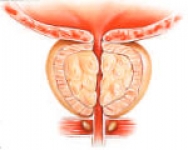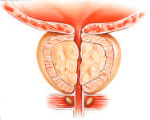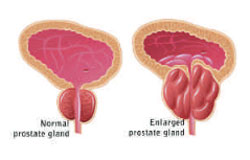Prostate Cancer Awareness


What is the prostate gland?

The prostate is a small gland at the base of the bladder. It is about the size of a walnut but enlarges with aging.
The prostate surrounds the first part of the tube (urethra) that carries urine from the bladder to the penis. The same tube also carries semen, the fluid containing sperm.
The prostatic secretion is important for the proper functioning of the sperm cells, and therefore also for fertility in men. The thin, milky liquid contains many enzymes such as the prostate-specific antigen (PSA). This enzyme makes the semen thinner to aid in the process of fertilization.
What are the facts about prostate symptoms?

- By the age of 65 years, half of men will experience benign enlargement of the prostate. At the age of 90, 90% of men have prostatic enlargement.
- An enlarged prostate alone does not always cause symptoms.
- The severity of the symptoms is not related to the size of the prostate.
- 1 in 3 men will suffer prostatic symptoms during their life.
- 1 in 10 men will require surgical treatment for their symptoms.
- Not all urinary symptoms in men are due to an enlarged prostate; incontinence, pain or blood in the urine may be due to other conditions.
- The risk of prostate cancer is not increased by having benign enlargement of the prostate. You are no more likely to develop prostate cancer than a man without benign prostatic enlargement.
Who gets it
Prostate cancer is normally a disease of older men. More than half the men (50%) diagnosed with prostate cancer in the UK each year are aged 70 and over. It is more common in Caribbean and African men. A man’s risk of developing prostate cancer depends on many factors. These include:
- Age
- Genetics and family history
- Lifestyle factors
- Other medical conditions
When to see your doctor
- See your doctor if you have any of the changes described here.
- The changes might not mean that you have cancer but it is important to get them checked.
Why is spotting cancer early so important?
Spotting cancer early, and getting treated, gives you a better chance of beating the disease.
Symptoms
Early prostate cancer often has no symptoms at all.
If you do have symptoms they can be similar to those of other prostate conditions.
These symptoms include:
- Having erection problems
- Having any problems passing urine, such as rushing to the toilet to pass urine or passing urine more often (especially at night)
- Having visible blood in your urine
- Are at higher risk of prostate cancer
Seeing your doctor:
Your doctor will assess your prostate by the following tests to help them decide on further management:
- An examination of your prostate gland to check for abnormal signs, such as lumpy or hard areas (digital rectal examination)
- A prostate specific antigen (PSA) blood test
Cancer screening

Cancer screening is for healthy people without symptoms and aims to prevent or find cancer at an early stage when the chances of successful treatment are higher. Screening has harms as well as benefits, you should be well informed to help you decide if you would like to take part.
There is no prostate screening programme because there isn’t a good enough test available. Overall the evidence shows prostate screening doesn’t reduce the number of men who die from prostate cancer. Men over 50 can ask their doctor for a PSA test. Your doctor should discuss the harms and benefits to help you decide if it’s right for you.
The European Randomized Study of Screening for Prostate Cancer has published its 11-year follow-up results (New England Journal of Medicine, March 15 2012). Once again, they demonstrate that screening does significantly reduce death from prostate cancer. The latest study confirms that a man who undergoes PSA testing will have his risk of dying from prostate cancer reduced by 20%. However, population based screening for prostate cancer remains controversial.
References:
- http://www.cancerresearchuk.org/about-cancer/prostate-cancer/symptoms.
- British Association of Urological Surgeons (http://www.baus.org.uk/patients/information/cancer.aspx).
- http://publications.cancerresearchuk.org/publicationformat/formatleaflet.
- European Randomised Study of Screening for Prostate Cancer (http://www.erspc.org/news/study-results/).



